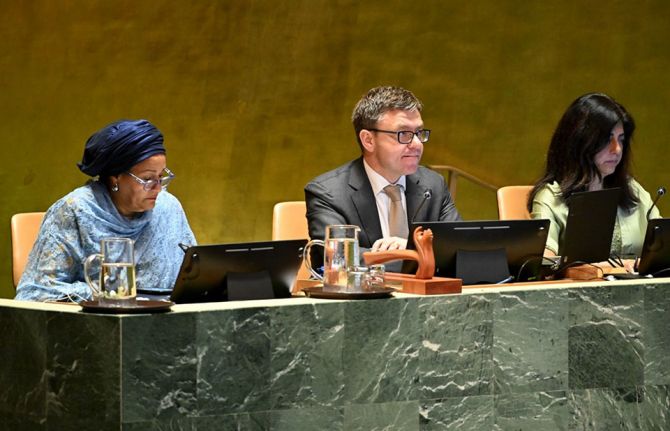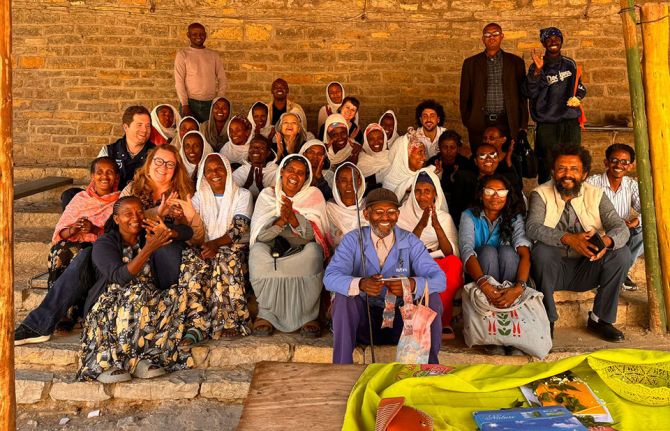
Feature Story
TB/HIV - Interlinking epidemics
21 June 2007
21 June 2007 21 June 2007With HIV-related tuberculosis (TB) cases increasing in many parts of Africa, Dr Chakaya Muhwa highlighted the work of the Kenyan government to establish clear policy guidelines and effective organizational structures. These have come at a time when TB is emerging as a serious public health problem in Kenya, compounded by the appearance of drug-resistant TB strains that are making the disease that much more difficult and expensive to treat.
In his presentation, “TB/HIV: Integration of Services and Stopping the Newest Epidemic” Dr Chakaya said TB and HIV programmes should work together because the link between the two diseases was clear. He emphasised the importance of treating all illnesses associated with HIV and the need to improve health care systems. He also flagged the need to base human resource needs on staffing norms, not on workload assessment. He also stressed the need to recognise best practice in adequately controlling HIV and TB infections. “Inadequate infection control practices encourage the transmission of HIV and TB,” he said. TB control programmes needed to be strengthened and better coordinated with HIV programmes.
Links:
More on the implementers' meeting
Related

Feature Story
Mothers as mentors
21 June 2007
21 June 2007 21 June 2007As part of efforts to prevent transmission of HIV from new mothers to their babies, South Africa has set up a programme called “Mothers to Mothers” (m2m). As part of the programme, women are trained to mentor other pregnant women and new mothers living with HIV. Mr Gene Falk explained that Mothers to Mothers was proving to be an effective, sustainable model of care. The women can also use a telephone hotline which has been an important channel of conveying education and support. Public education through TV shows also proved to be one of the most effective ways of informing women about mother-to-child transmission of HIV.
In Zambia there are over 16 % of adults aged 15-49 are living with HIV. Dr. Namwinga Chintu from Zambia’s Center for Infectious Research said that follow up to identify infants who’d been exposed to HIV, was a priority. She added that in Zambia, initiatives aimed at preventing mother to child transmission of HIV had been increased thanks to collaboration between the Zambian government and partners backed by the US government. In a country where the AIDS epidemic has had a devastating impact on all facets of Zambian life, she said that co-operation between government and partners involved in the AIDS response was crucial. She called for innovative funding programmes to help prevent mother to child transmission of HIV and for the implementation of methods that support government ownership.
“A little push in the right direction can make a big difference,” she said
She cited many challenges in implementing HIV programmes, including competing health priorities, how to deliver services to hard-to-reach areas and the poor rates of facility deliveries.
Links:
More on the implementers' meeting

Feature Story
Improving confidentiality and security of HIV information
21 June 2007
21 June 2007 21 June 2007
Ensuring that HIV information is securely stored and
confidentiality maintained will avoid potential
stigmatization and discrimination of individuals and
communities. Photo credit: UNAIDS/A.Gutman
In middle-and lower-income countries there is a push to improve patient management and the monitoring and evaluation of HIV services. To do this, all information systems, either paper-based or electronic, need to allow for relatively easy access to information. To ensure that patient confidentially is not compromised in the process, new guidelines have been released.
The ‘Interim Guidelines on Protecting the Confidentiality and Security of HIV Information’ offer information on data transfer, guiding principles, even disposal of information all to help maintain patient confidentiality.
Developed through a special workshop supported by UNAIDS and the United States President’s Emergency Plan for AIDS Relief (PEPFAR), international health professionals and people living with HIV reviewed existing materials that could then be adapted to middle- and lower-income countries.
“Good clinical information is required for optimum treatment and care for people living with HIV.” said Eddy Beck, Senior Technical Officer, UNAIDS Evaluation Department. “Ensuring this information is securely stored and confidentiality maintained will avoid potential stigmatization and discrimination of individuals and communities, and enhance the quality of the information collected,” he added.
The new guidelines provide definitions, guiding principles and technical recommendations for the maintenance of privacy, confidentiality and security in working with HIV-related information.
The main recommendations from the guidelines:
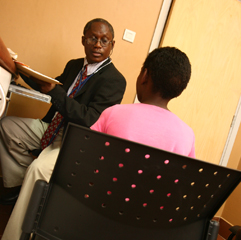
Using health data for public health goals must be
balanced against individuals’ rights to privacy and
confidentiality. Photo credit: UNAIDS/A.Gutman
- Using health data for public health goals must be balanced against individuals’ rights to privacy and confidentiality;
- Health data need to serve the improvement of health and reduction of harm for all people. Policies, procedures, and technical methods must be balanced to protect both;
- individual and public rights must be balanced, and should be based on human rights principles;
- Within countries, privacy and confidentiality laws should be developed and put in place; relevant parameters of privacy or confidentiality laws must be reviewed and known by all persons accessing health data;
- The development and review of laws and procedures related to HIV information needs active participation from relevant stakeholders, including people living with and affected by HIV, health care professionals, and legal and ethical experts;
- Funding organizations should comply with these guidelines and make funding available to implement them. Maintaining security and confidentiality must be a condition for funding.
These interim guidelines will be field tested and additional training materials will be developed.
Links:
Download the ‘Interim Guidelines on Protecting the Confidentiality and Security of HIV Information’
Related

Feature Story
Focus on: HIV and refugees
20 June 2007
20 June 2007 20 June 2007
Conflict and displacement make refugees highly
vulnerable to the risk of HIV. Photo credit: UNAIDS
As UNHCR announces that the number of refugees has increased for the first time since 2002, AIDS remains a key challenge for growing displaced populations.
Displacement of people has an enormous effect on their lives, as well as upon the lives of host communities.
Conflict and displacement make refugees highly vulnerable to the risk of HIV. As refugees struggle to meet their basic needs such as food, water and shelter, women and girls are often forced to exchange sexual services for money, food or protection. And too often refugees are excluded from national AIDS initiatives and policies and subsequently do not have access to vital HIV prevention and treatment services.
Access to basic HIV-related care and support for refugees is also rarely given adequate attention. For women and girls in particular, conflict and displacement heighten their vulnerability to the risk of HIV. During conflict, rape is often used as a weapon of war. Women and girls are also often subject to sexual violence and exploitation in refugee settings.
A policy brief developed by UNAIDS and the UN High Commission on Refugees (UNHCR) focuses specifically on actions required to prevent HIV and mitigate the effect of HIV on refugees and their host communities.
The policy brief focuses on emergency and post-emergency phases and suggests actions for governments, civil society and international partners in order to ensure that refugee and human rights laws are applied, and that the needs of refugees are included into national HIV policies and programmes.
Links:
Read the policy brief on HIV and Refugees
More on Emergency and humanitarian response - Technical Policies of the UNAIDS Programme
Read more stories on HIV and refugees from UNHCR

Feature Story
Women's Tour to five countries of the Commonwealth Independent States - photo gallery
19 June 2007
19 June 2007 19 June 2007Women against AIDS tour was conceived in the midst of a growing concern that women are increasingly at risk of HIV infection in many parts of Eastern Europe and Central Asia. The percentage of adults living with HIV who are women has risen from 11% in 1990 to 28% in 2006.
The tour was sponsored by the AIDS Infoshare organization, UNAIDS, the Global Coalition of Women on AIDS and the United Nations Development Program. Ten AIDS advocates from the region with special guests joining at various points travelled together to learn about the realities of women and AIDS in different parts of the region and also to mobilize local policy makers to act on these issues.
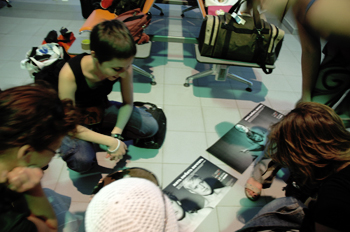
Moscow, 27 May - The team is at Sheremetievo Airport. Could not wait to look at the posters and unpacked them right before flying to Almaty (Kazakhstan).
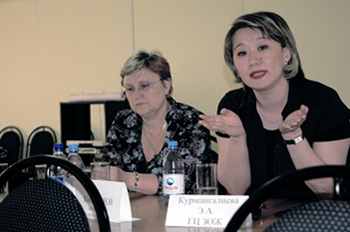
Kazakhstan, 27-28 May - Elnara Kurmangalieva (State Centre for Healthy Life Style) informing about HIV prevention programmes among youth.
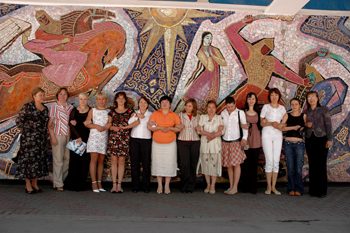
Kazakhstan, 27-28 May - Group photograph.
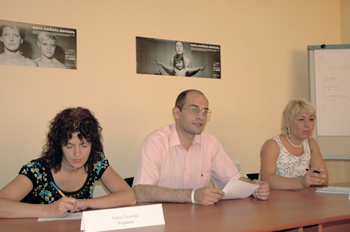
Armenia, 29-30 May - Oganes Madoyan (Real World - real People) opens the discussions. None of the HIV positive women from Armenia was ready to talk openly and express the needs of the community.
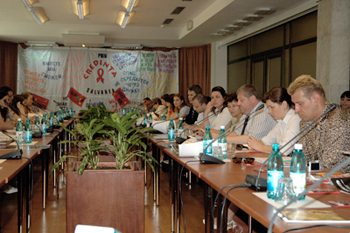
Moldova, 30 May-1 June - Aleksander Shishkin (actor and DJ) first on the right side, joined the round table discussions to support implementation of gender specific programmes in Moldova. He also reiterated the need to carry out information campaigns on HIV prevention for young people.
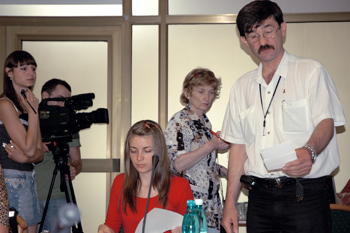
Moldova, 30 May-1 June - Igor Kilchevski (Credinta) offers to discuss the recommendations of the project participants. High stigma and discrimination is perceived by women living with HIV in Moldova.

Ukraine, 2-5 June - Welcoming remarks by Anna Grekova (All-Ukrainian Network of PLHIV) at a press event.

Ukraine, 2-5 June - A cameraman filming for the national TV channel. The media can play a critical role in reducing stigma and discrimination towards women living with HIV.
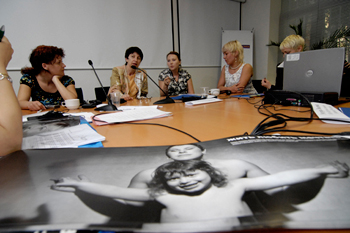
Moscow, 6 June - UNAIDS Deputy Executive Director Debbie Landey plays a key role in addressing gender dimension to the response to HIV. She actively participated in the Tour.
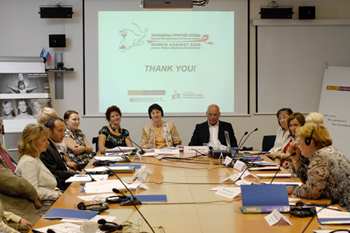
Moscow, 6 June - Round table participants: (from left) Natalia Ladnaya (Federal AIDS Centre), Sergei Golovach (Photographer), Anna Dubrovskaya ('Golos Anti-SPID' NGO, Ufa, Russia), Elena Tamazova (UNAIDS, Russia), Anna Grekova (All-Ukrainian Network of PLHIV), Debbie Landey (DExD, UNAIDS), Vladimir Pozner (President of the Russian TV Academy), Lyudmila Untura ('Childhood for All' NGO, Moldova), Maria Ivannikova (AIDS Infoshare, Russia), Tatiana Stupak ('Victoria' NGO, Kazakhstan), Larisa Dementieva (Federal Service for Protection of Consumer Rights and Human Wellbeing)
All photo credit: UNAIDS/Serge Golovach
Links:
Read full story
Visit the website of the Global Coalition on Women and AIDS

Feature Story
Scaling up through partnerships
15 June 2007
15 June 2007 15 June 2007
The 2007 HIV/AIDS Implementers’ Meeting is
expected to attract over 1,500 people under the
theme ‘scaling up through partnerships’.
Donors, AIDS experts and implementers from around the world are gathering in Kigali, Rwanda to attend the 2007 HIV/AIDS Implementers’ Meeting.
The meeting, hosted by the government of Rwanda and cosponsored by PEPFAR, the Global Fund to Fight AIDS, Tuberculosis and Malaria; the UNAIDS Secretariat, UNICEF, WHO and the World Bank, will take place from 16-19 June and is expected to attract over 1,500 people under the theme ‘scaling up through partnerships’.
Participants will include civil society representatives, donors, governments, UN organizations and non governmental organizations, who will share concrete, country-level programmatic examples of what’s working in the AIDS response and what needs improvement.
In past years the meeting has served principally as an annual gathering for the U.S. Government and its global AIDS grantees, but this year, the 2007 HIV/AIDS Implementers Meeting has adopted a much broader scope and involved many more partners.
“We have worked closely with the US government, the Government of Rwanda and other partners over the past few months to help shape the meetings structure and agenda,” said Dr Kékoura Kourouma, UNAIDS Country Coordinator in Rwanda. “The strong participation of many international cosponsors––combined with the exemplary leadership of the Government of Rwanda––is a strong signal of the increasing and very necessary, coordination and collaboration now evident in the global AIDS response,” he added.

More than 500 project summaries will be presented,
representing some of the many HIV prevention, care
and treatment programmes being implemented
around the world.
Unlike the biannual International AIDS Conferences, and other similar meetings, which primarily provide a platform for exchanging research findings, announcing important technological advancements and advocating around global AIDS policy issues, the 2007 HIV/AIDS Implementers Meeting will focus specifically on implementation.
Issues will be raised on; how best to coordinate as more partners become involved in the AIDS response; how to maximize on lessons learnt, on resources raised and on the leadership that has been leveraged to scale up HIV prevention, treatment, care and support on the ground to move the AIDS response to the next level.
More than 500 project summaries will be presented, representing some of the many HIV prevention, care and treatment programmes being implemented around the world.
Summaries include:
- Integrating HIV and TB services in district hospitals in Kenya.
- District level planning, monitoring and evaluation capacity – Experience of Rwanda
- Contracting––‘Retired but not yet tired’ Health staff in Tanzania.
- Involvement of traditional birth attendants for the prevention of mother to child transmission of HIV in Uganda.
- Know your epidemic – Secondary School Communications clubs for behaviour change.
- The impact of safe blood-bank screening and transfusion practices in Mozambique.
- Challenges of HIV testing and counselling in health facilities, all countries.
Through sharing lessons learnt in the scale-up of AIDS programmes, the meeting will promote an open dialogue about future directions with a strong emphasis on implementation and identification of critical barriers that are causing ‘bottlenecks’ in terms of getting vital resources to the people that need them most and ‘making the money work’.
“This meeting will be a real opportunity for partners in the AIDS response to come together to tackle the tough challenges and move forward with one voice to accelerate and sustain global AIDS efforts,” said Michel Sidibe, UNAIDS Deputy Executive Director. “Only through joint efforts from all sectors and at all levels, will we be able to move towards universal access to HIV prevention, treatment, care and support–– especially towards implementation––this meeting is an important step in making this possible,” he added.
Links:
Read press release ( en | fr | kr )
Related

Feature Story
Prevention programming for young people
16 June 2007
16 June 2007 16 June 2007Following the official opening of the HIV/AIDS Implementers Meeting in Kigali, presenters from Ethiopia, Mozambique, Uzbekistan, Namibia and Haiti shared their experiences in HIV prevention programming for young people.
During the session, Robert Bernard Morehead of the US Peace Corps gave a presentation on “Secondary School Communications Clubs for Behaviour Change in Young Mozambican Men”. Mr Morehead explained that the communication programme was aimed at reducing HIV incidence among young people in secondary schools in Mozambique. “Our approach is to work with young men and guide them on behaviour change,” he said.
In Mozambique in 2005, the prevalence rate among adults aged 15-49 was 16.1%, with 10.7% among young women aged between 15-24 and 3.6% among young men of the same age range. Mr Morehead emphasized the need to explore individuals’ and society’s gender stereotypes, to discuss with young women in facilitated sessions and recognize how gender inequalities can lead to HIV transmission. He also highlighted the necessity of involving community professionals to provide technical support for peer educators. The evaluation of the programme observed that at the end of the programme students did articulate an understanding of how some traditional male roles can increase the risk of HIV transmission.
Another approach, used in the Amharic Region of Ethiopia and presented by Annabel S. Erulkar of the Population Council, aims to prevent new HIV infections and promote mutual faithfulness through addressing the risk of HIV transmission among adolescents. Erulkar said that religious institutions may be the only sustained institutional contact for rural populations. With a population of more than 19 million people, the Amharic region is the biggest in Ethiopia. Some 89% of is inhabitants are rural.
The introduction of youth-friendly health services in Uzbekistan is another model that was presented at the session. Komiljon Akhmedov of UNICEF noted the need to use youth-friendly services when focusing on young adolescents who are the most at risk in Uzbekistan.
Mr Akhmedov said that the number of HIV cases had been growing among young people in Uzbekistan and added that 35% of adolescents engaged in selling sex could not identify the modes of HIV transmission. He stressed the need to involve parents in the programmes as reproductive health information sessions cannot be provided to juveniles without their parents’ consent.
Johane Philogene from Haiti shared her experiences on working on a model of an adapted nationwide multi-faceted HIV program for young people. “This programme is based on the active participation of young people as key actors in all interventions,” she said. A network of 15 youth-friendly centres in Haiti were set up and offer a number of activities including education, training, and edutainment. More than 38,000 youths have been tested for HIV in Haiti while 30,000 are receiving family life education training.
Rushnan Murtaza of UNICEF Namibia presented on the “Window of Opportunities” programme which has been set up to support children in Namibia. Namibia is a country that enjoys a per capita income of US $1,800 but 42% of rural families still live in poverty and HIV prevalence among 14-19 year-olds was at around 10% in 2005. Murtaza noted that findings in 2006 in one region showed that 41% of girls had dropped out of school due to pregnancy.
Participants debated the importance of supporting youth programmes and particularly those focusing on those most at risk of HIV infection. They emphasized the need to advocate for young people so that concerted efforts could be put in place to help prevent HIV infection. Participants agreed that it is crucial to establish trust with young people and to coordinate interventions with other stakeholders involved in similar programmes.
Links:
Related

Feature Story
HIV Implementers meeting opens in Kigali
16 June 2007
16 June 2007 16 June 2007Representatives from over 50 countries came together in Kigali on 16 June for the opening session of the HIV/AIDS Implementer’s Meeting. The opening remarks highlighted the importance of leadership and of scaling up partnerships to improve the quality and impact of the response to the AIDS epidemic.
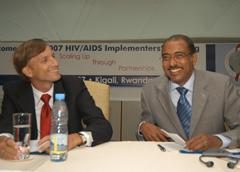
(L to R) Ambassador Mark Dybul of the Office of the
U.S. Global AIDS Coordinator and Michel Sidibe,
UNAIDS Deputy Executive Director during the
opening session of the 2007 Implementers' Meeting.
16 June Kigali, Rwanda.
All speeches praised the inspirational leadership shown by the participating countries which marked a significant result in the AIDS response and in scaling up through partnerships. The courage and commitment of people living with HIV to the AIDS response was also singled out as having helped share lessons learnt, saving lives, enhancing ownership of lives and caring for orphans and vulnerable children.
Ambassador Mark Dybul of the Office of the U.S. Global AIDS Coordinator emphasised the shift in considering communities no longer as recipients but as ‘partners through understanding and trust’. “Working together makes everything possible,” he said.
Michel Sidibe, UNAIDS Deputy Executive Director, representing Dr. Peter Piot, UNAIDS Executive Director, underscored five key strategic areas:
- Spending money on programmes and priorities owned by communities who understand their epidemics;
- Enhancing capacity in education and social services; and making use of communities and civil society as invaluable resources;
- Shifting from short term interventions to more strategic long term approaches (the Global Fund talks about programmes not projects);
- Putting AIDS at the core of any development programme;
- Scaling-up for greater efficiency in delivering results without loosing money on the way.
In his opening key note address, His Excellency the President of the Republic of Rwanda, listed the achievements to date and elaborated on the drivers of progress. “Experience has shown that accountability with vision achieves the goal,” he said. He further insisted on making a breakthrough in strengthening health systems by joining forces with development partners to build capacity.
Speakers reminded programme implementers on the issue of involving communities and enhancing their capacity to better respond to the AIDS epidemic in developing countries. They also urged them to consider community based organisations as having a key role to play in both designing and implementing programmes.
The greater involvement of people living with HIV was stressed in terms of improving quality and effectiveness of AIDS responses, as was the participation of civil society in moving the universal access process forwards. Stigma, discrimination and gender issues were also highlighted as barriers for an effective response to HIV prevention.
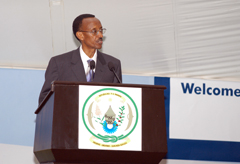
In his opening key note address, His Excellency the
President of the Republic of Rwanda, listed the
achievements to date and elaborated on the drivers
of progress.
While considering some of the real achievements in terms of HIV prevention in Africa, all speakers highlighted the importance going far beyond where we are now in terms of improving quality of interventions by moving from projects to sustainable programmes as a response to AIDS in Africa.
Based on what has been achieved and recognising the support of donors in Rwanda and in Africa on the whole, the remarks of His Excellency the President of the Republic of Rwanda expressed the commitment of Rwanda to beyond what has been achieved already. The session also reminded participants of the important steps which need to be taken in assessing past performance and finding ways of setting up innovative efforts to combat AIDS.
Participants were actively encouraged to take this opportunity to discover ways and strategies to maximize impact and work together through a comprehensive participatory approach for sustainability of programmes on AIDS.
Links:
More on the implementers' meeting
Related

Feature Story
Breaking the silence in Mozambique
14 June 2007
14 June 2007 14 June 2007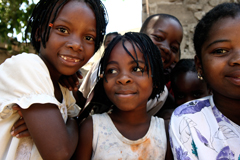 The Joint UN Gender Programme in Mozambique
The Joint UN Gender Programme in Mozambique supports the growing number of women and girls
living or affected by HIV.
Credit: UNAIDS/A.Gutman
In 2005 a four-year Joint UN Gender programme was established in Mozambique to support the growing number of women affected by the AIDS epidemic in the country. The Joint Programme is funded by the Flanders Government, coordinated by UNAIDS and is being implemented by the United Nations Population Fund in partnership with the World Health Organization, the Food and Agriculture Organisation of the United Nations, the National Aids Council, the Ministry of Women and Social Action and networks of civil society organizations.
The programme is strengthening and supporting a multisectoral response to the AIDS epidemic by focusing on partnerships, together with the empowerment of women’s organizations and associations of people living with HIV. A national advocacy campaign on women and girls is being developed and best practices are being identified that can be replicated in the national AIDS response.

Meeting of "Ahitipaluxene" (meaning “let’s break
the silence”), a care and support association of
women living with HIV.
Credit: UNAIDS/A.Gutman
One national non-governmental organisation being supported through the Joint Programme is Ahitipaluxene, meaning “let’s break the silence”, which is an association of women living with HIV. Ahitipaluxene is an affiliate of Kuyakana a national network of women living with HIV and one of the networks involved in the four-year Joint UN Gender programme.
Ahitipaluxene’s core activity is the provision of food rations and home based care to people living with HIV. In addition the association carries out advocacy on human rights on AIDS related issues. Furthermore, members undertake fundraising activities such as knitting red ribbons as well as designing and making clothes.
UNAIDS and partners are supporting Ahitipaluxene to strengthen their institutional capacity in strategic planning, proposal development, and communication. Established in 2004 and registered in 2006, Ahitipaluxene has 23 full-time members and supports more than 125 people receiving antiretroviral treatment. During 2007, it expects to support an additional 110 people who have not yet started treatment.
More on Mozambique
More on the Implementers' Meeting
More on Women and AIDS
Visit the website of the Global Coalition on Women and AIDS
Related

Feature Story
AIDS responses in post-conflict Sierra Leone
12 June 2007
12 June 2007 12 June 2007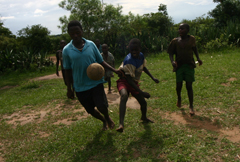
In the post-conflict reconstruction of Sierra Leone,
the response to the AIDS epidemic came far down
the list of priorities.
The decade long brutal civil war in Sierra Leone was officially declared over in 2002. But in a country which is ranked 176 out of 177 in the Human Development Index*, the government is confronted with many different priorities all equally important (energy, infrastructure, health, education, water and sanitation) and all competing for the limited resources available.
In 2005, HIV prevalence in Sierra Leone was at 1.6%, but in the post-conflict reconstruction of Sierra Leone, the response to the AIDS epidemic came far down the list of priorities.
In a bid to strengthen the response to AIDS in the country UNAIDS established an office in Freetown in January of 2005 which helped pave the way for HIV to be mainstreamed into development instruments and forums such as the Poverty Reduction Strategy, the United Nations Development Assistance Framework, the Development Partners’ Committee and Donors’ Consultative Group meetings.
Through the institutional support provided to the National AIDS Secretariat (NAS), the first costed national strategic plan (2006-10) which provided the basis for coordinating the work of all partners was formulated, validated and launched.
Improved capacities of NAS to better plan and program coupled with timely submission of requests for replenishment of funds enhanced the implementation of the World Bank funded HIV Project (SHARP). As a result, additional financial resources were leveraged from the Global Fund to fight AIDS, Tuberculosis and Malaria to scale up access to HIV prevention, treatment, care and support (phase two round four and round six amounting to US$ 36 million).
This additional funding helped strengthen the promotion, support and coordination of activities addressing HIV among populations of humanitarian concern including armed and uniformed groups, migrants and mobile populations.
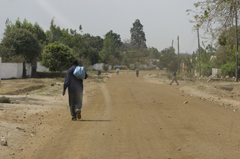
UNAIDS established an office in Freetown in January
of 2005 which helped pave the way to strengthen
the response to AIDS in the country.
The government and the private sector are now gradually becoming more involved and have formed a Parliamentarian Committee on HIV and the Multi Disciplinary Task Force that are spearheading a draft bill that recognizes, promotes and protects the rights of people living with HIV. The Chamber of Commerce of Chief Executive Officers/Managers has also set up a project to work on the challenges HIV poses to their businesses and the importance of their involvement in the national AIDS response.
With the establishment of the UN Joint Team on AIDS, the Expanded Technical Working Group and the United Nations Theme Group on HIV, a more coherent and coordinated United Nations’ support to the government is being harnessed.
*The Human Development Index provides a composite measure of three dimensions of human development: living a long and healthy life (measured by life expectancy), being educated (measured by adult literacy and enrolment at the primary, secondary and tertiary level) and having a decent standard of living (measured by purchasing power parity, PPP, income)
Links:
More on Sierra Leone
Read more on the implementers' meeting






